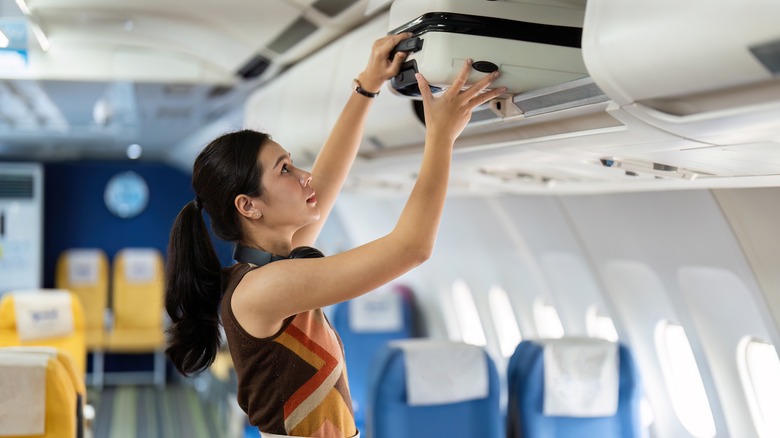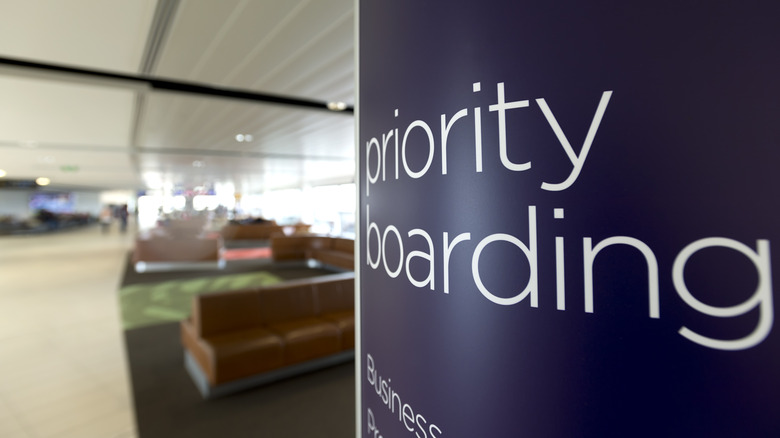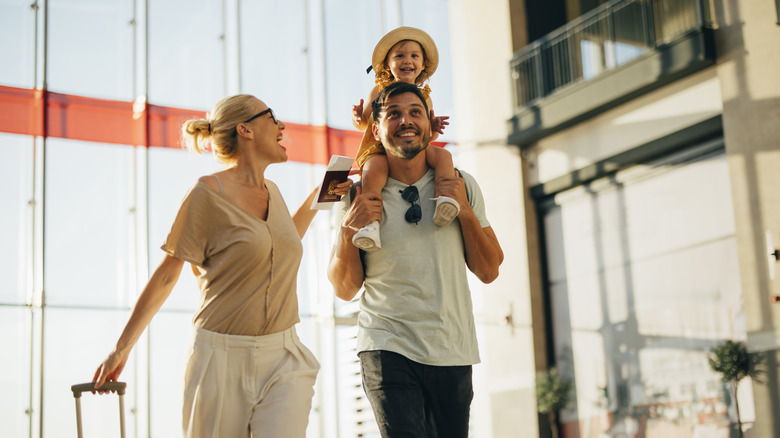One Crucial Thing Experts Say Travelers Must Do To Secure An Overhead Bin Spot For Your Carry-On
Let's say you've arrived on time for your flight, taken advantage of this game-changing airport check-in hack to avoid long lines, and packed all of your personal effects in your carry-on just right to make sure that you zipped through TSA with ease. You pat yourself on the back for how smoothly this getaway has gone so far — especially proud of the ultra-cheap fare you scored, which makes it all the more worthwhile. You arrive at your gate with plenty of time to spare, and the plane's ready to board, but your ticket says you'll be in the last group embarking.
The passenger service agent's voice comes on through the loudspeaker to welcome guests to the flight before announcing, suddenly, that "this is a full flight and we anticipate running out of overhead bin space." And, since no volunteers step forward to check their carry-ons, it likely means they'll be sending your one-and-only bag off to the cargo hold. Now, you'll have to dig out your laptop and valuables and walk onto the plane with a pile of snacks, drinks, books, and your laptop spilling out of your arms. Your only mistake? Not looking into priority boarding.
In conversation with CNBC, Henry Harteveldt, founder of Atmosphere Research Group, and a student of travel industry trends, said that priority boarding is the definitive solution for passengers who want to ensure their carry-on bags secure overhead bin space without having to rush or compete with other travelers.
What is priority boarding and how does it work?
According to Sara Wilcox, a travel advisor at the Fora Travel agency, "the number one reason to buy the early boarding upgrade is if you have a carry-on for the overhead bin" (via CNBC). But that's not the only thing this add-on entitles you to. For example, American Airlines emphasizes that their priority privileges offer passengers expedited access through the busiest areas of airports, with dedicated "Priority" signage to guide travelers through check-in counters, security checkpoints, and gate areas — no hacks needed! These privileges are complimentary to all first, business, and premium economy class passengers.
Most airlines also offer you the chance to separately purchase a "priority" add-on by itself for a reasonably low price. American Airlines charges as little as $9 for this on domestic flights. If you're not sure how busy your flight will be and if you'll need it, you can wait until it's time for online check-in and buy it then.
Even if you've already made your seat selection, you can review the seating chart by opting to "change seats" with no need to actually alter your selection. However, this trick will let you see how many empty seats are currently available, giving you an idea of how full your flight is going to be. If there are only a handful of spots available, you can count on sharing your armrest — and possibly having to stuff your bag in a bin on the opposite side of the plane at best. If you want to avoid that hassle, or having to check your carry-on altogether, this is the time to upgrade.
How to get priority boarding without paying extra
As mentioned above, most premium fares — including first and business class seats — automatically get to board before economy. But they're not the only ones with priority boarding privileges. Most airlines, including American, United, and Delta, offer early boarding to their own flight club members, or members of their partner clubs. For instance, Delta has partnerships with Virgin Atlantic and American Express; United is part of the Star Alliance aviation program; and American Airlines has agreements with Citibank and Oneworld. As such, it can be to your advantage to fly with the airline that you've already got complimentary perks from through either your credit card or other club memberships.
If you are a member of an airline's loyalty program, you know it can take ages to save up enough points or miles to reward yourself with a full flight fare. However, you can typically redeem points before then by putting them to good use toward last-minute upgrades like better seats or early boarding. Active-duty U.S. Military personnel typically get to walk on first as well, so if you're traveling domestically with someone currently employed by the armed forces full-time, you'll get to skip the line with them.
Passengers who need special assistance also board early, typically before or after first and business class are called. This can include anyone who needs wheelchair assistance; is traveling with a mobility or medical device; requires assistance for hearing, vision, cognitive or developmental disabilities; or is traveling with a preapproved service animal. Senior travelers may also request priority boarding with their gate agents upon arrival. If any member of your party needs assistance, you get their priority status as well. Finally, almost all airlines let families board the plane early when flying with kids.


